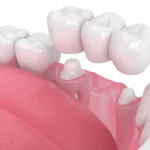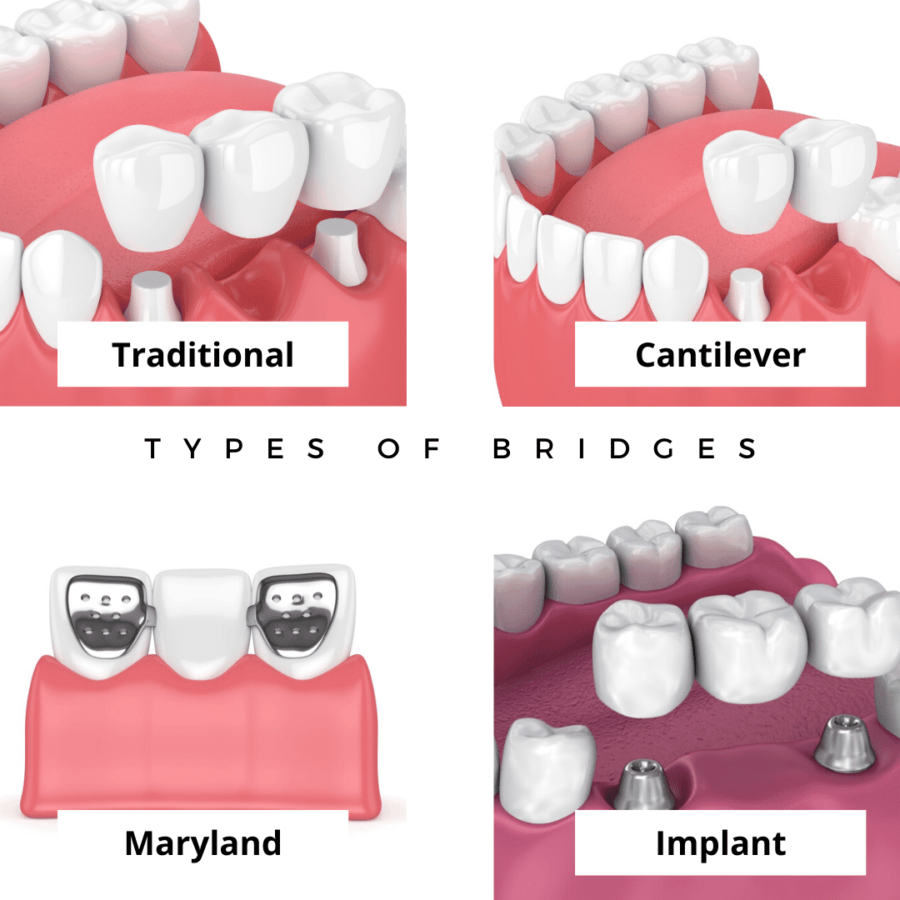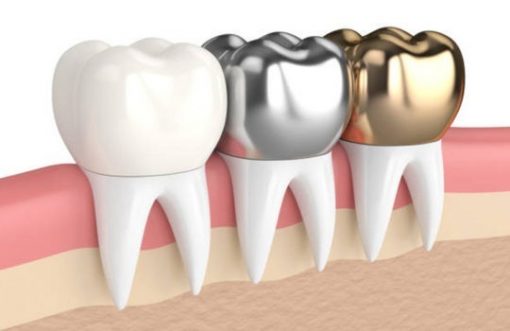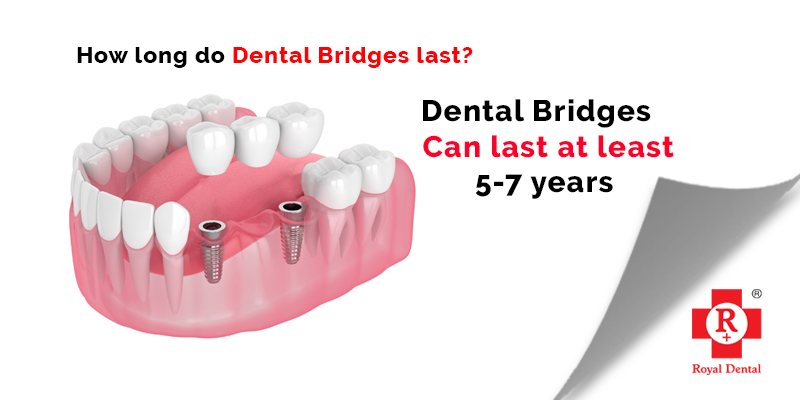If you’re looking for a way to bridge the gap in your smile, dental bridges may be the perfect solution. Whether you’re missing one or several teeth, bridges can restore your smile and improve your oral health. But what are bridges, and what do you need to know before getting one? This guide will help to understand all you need to know about dental bridges, crowns including the different types restorations. Learn how dental crowns can give you a beautiful and healthy smile, and why they’re an excellent choice to replace missing teeth.

Dental bridges are a type of dental restoration used to replace missing teeth. They consist of one or more artificial teeth, called pontics, which are supported by adjacent teeth or dental implants. Bridges can help restore the appearance of your smile, improve your ability to chew and speak, and prevent the remaining teeth from shifting out of position.
What are Dental Bridges?
A dental bridge is an appliance used to replace missing teeth. It is typically made up of two crowns and one or more false teeth, which are connected to fill the gap caused by a missing tooth. The crowns are placed on the teeth adjacent to the space left by the missing tooth. This bridge is then secured in place with dental cement or dental implants.
The false teeth in the bridge are made of either porcelain or metal and can be customised to match the colour and shape of the existing teeth. Tooth bridges are a permanent solution to missing teeth and can last up to 10 years or more with proper care. They are a great option for those who are looking to restore their smile and improve their oral health.
Benefits of Dental Bridges and Crowns
Improved bite: Dental bridges can help restore a patient’s ability to bite and chew food properly. Without a bridge, the teeth adjacent to a missing tooth can shift and cause the bite to be uneven.
Improved appearance: Teeth bridges can help restore the appearance of a patient’s smile. The bridge helps fill in the gap caused by the missing tooth, giving the patient a more natural-looking smile.


Improved speech: A dental bridge can help improve a patient’s speech. Without a bridge, the missing tooth can cause a person’s speech to be slurred or difficult to understand.
Improved oral health: Dental bridges help protect adjacent teeth from further wear and tear. They also help prevent gum disease and other oral health issues.
Types of Dental Bridges Crowns
Traditional bridges: Traditional bridges are the most common type of dental bridge. They are typically made up of two crowns and one or more false teeth, which are connected to fill the gap caused by a missing tooth. The most common type of dental bridge, in which the pontic is held in place by dental crowns attached to adjacent teeth.
Cantilever bridges: Cantilever bridges are similar to traditional bridges, but instead of being connected to two crowns, they are only attached to one. They are typically used when the missing tooth is at the end of a row of teeth. A type of bridge used when there are adjacent teeth on only one side of the missing tooth or teeth.
Maryland bridges: Maryland bridges are made of porcelain or plastic and are held in place by two metal bands. These bridges are usually used when the missing tooth is in the front of the mouth. A type of bridge where the pontic is supported by a metal or porcelain framework that is bonded to the back of adjacent teeth.
Implant-supported bridges: Implant-supported bridges are held in place by dental implants instead of crowns. These bridges are typically used for patients who are missing several teeth in a row.
Types of Dental Crowns
Ceramic Crowns: Ceramic crowns are made of a high-quality dental ceramic that looks and feels like natural teeth. They are an excellent option for front teeth and can be color-matched to your existing teeth.
Porcelain-Fused-to-Metal Crowns: Porcelain-fused-to-metal crowns consist of a metal shell with a layer of dental porcelain fused to the outside. They are a good option for back teeth, as they are durable and provide good support.

Gold Crowns: Gold crowns are made of a gold alloy and are one of the strongest and most durable types of crowns. They are a good option for back teeth and can last for many years.
Zirconia Crowns: Zirconia crowns are made of a strong and durable ceramic material. They are a good option for both front and back teeth and can be color-matched to your existing teeth.
Cost of Dental Bridges
The cost of bridges will vary depending on the type and the number of teeth that need to be replaced. The cost of traditional crowns can range from $1,000 to $4,000, while cantilever crowns can cost up to $5,000. Maryland bridges typically cost between $500 and $2,000, while implant-supported can cost up to $10,000 or more.
The cost of bridges can also vary depending on the dentist and the location of the practice. Most dental insurance plans will cover some of the cost of tooth bridges, so it’s important to check with your insurance provider to see if your plan covers any of the cost.
Procedure for Dental Bridges Crowns
Before getting a dental bridge, it’s important to have a thorough examination by a dentist. The dentist will examine your teeth and gums to make sure that you’re a good candidate for a dental bridge. The dentist will also take x-rays and impressions of your teeth to determine the best type of bridge for you.
Once the dentist has determined that you’re a good candidate for a dental bridge, the next step is to prepare the teeth. The dentist will numb the gums and teeth before filing down the teeth that will be used as anchors for the bridge. This is done to make sure that the bridge fits properly and securely.
The dental crowns procedure typically involves two or more visits to the dentist. During the first visit, the dentist will prepare the adjacent teeth to support the bridge by removing some of the enamel and reshaping the teeth. The dentist will then take impressions of your teeth, which will be used to create the custom bridge.
While your bridge is being made, you may wear a temporary bridge to protect your teeth and gums. During your second visit, the dentist will remove the temporary bridge and place the permanent bridge, making any necessary adjustments to ensure a proper fit.
Some potential risks and complications of dental bridges
If you experience any problems with your bridge, such as pain, sensitivity, or a loose bridge, you should contact your dentist immediately.
- Tooth decay or gum disease around the supporting teeth
- Bridge failure or detachment
- Damage to adjacent teeth or restorations
- Sensitivity to hot or cold temperatures
Overall, dental bridges can be an effective way to restore missing teeth and improve your oral health. By understanding the different types of bridges, the procedure involved, and how to care for your bridge, you can make an informed decision about whether a dental bridge is right for you.
Caring for Dental Bridges
Caring for Bridges crowns: To maintain the longevity of your dental bridge, it is important to practice good oral hygiene. This includes brushing twice a day, flossing daily, and visiting your dentist for regular check-ups and cleanings. You should also avoid chewing on hard foods or objects that could damage the bridge.
It’s also important to avoid habits such as clenching or grinding your teeth, as this can damage the bridge. If you’re a habitual grinder or clencher, it’s important to talk to your dentist about getting a night guard to protect your bridge.
Once the teeth bridge is in place, it’s important to take good care of it. It’s important to brush your teeth twice a day and floss at least once a day to keep the bridge and surrounding teeth clean. It’s also important to visit the dentist regularly for check-ups and cleanings to make sure that the bridge is in good condition.
Find the Right Dentist for Dental Bridges Crowns
When it comes to choosing the right dentist for tooth bridges, it’s important to do your research. You should look for a dentist who is experienced with the type of bridge you’re considering and who is familiar with your dental insurance plan. You should also make sure that the dentist has a good reputation and is willing to answer any questions or concerns that you may have.
It’s also important to make sure that the dentist is using the latest technologies and techniques to ensure the best results. You should also make sure that the office is clean and comfortable and that the staff is friendly and professional.
FAQs on Dental Bridges Crowns
What is the success rate of dental bridges?
Bridges have a success rate of up to 98%, depending on the type of bridge and the patient’s oral health.
How long do dental bridges last?
Dental bridges can last up to 10 years or more with proper care.
Are dental bridges painful?
No, dental bridges are not painful. The dentist will numb the gums and teeth before the procedure to minimize any discomfort.
How much do teeth bridges cost?
The cost of dental bridges can range from $1,000 to $10,000 or more, depending on the type of bridge and the number of teeth that need to be replaced.
Conclusion
Bridges are a great way to replace missing teeth and restore the appearance of your smile. They are a safe and effective way to improve your oral health and give you the confidence to smile again. With the right dentist and proper care, dental bridges can last up to 10 years or more. If you’re considering dental bridges, make sure to do your research and find a dentist who is experienced and knowledgeable. With the right dental bridge, you can have a beautiful and healthy smile.






